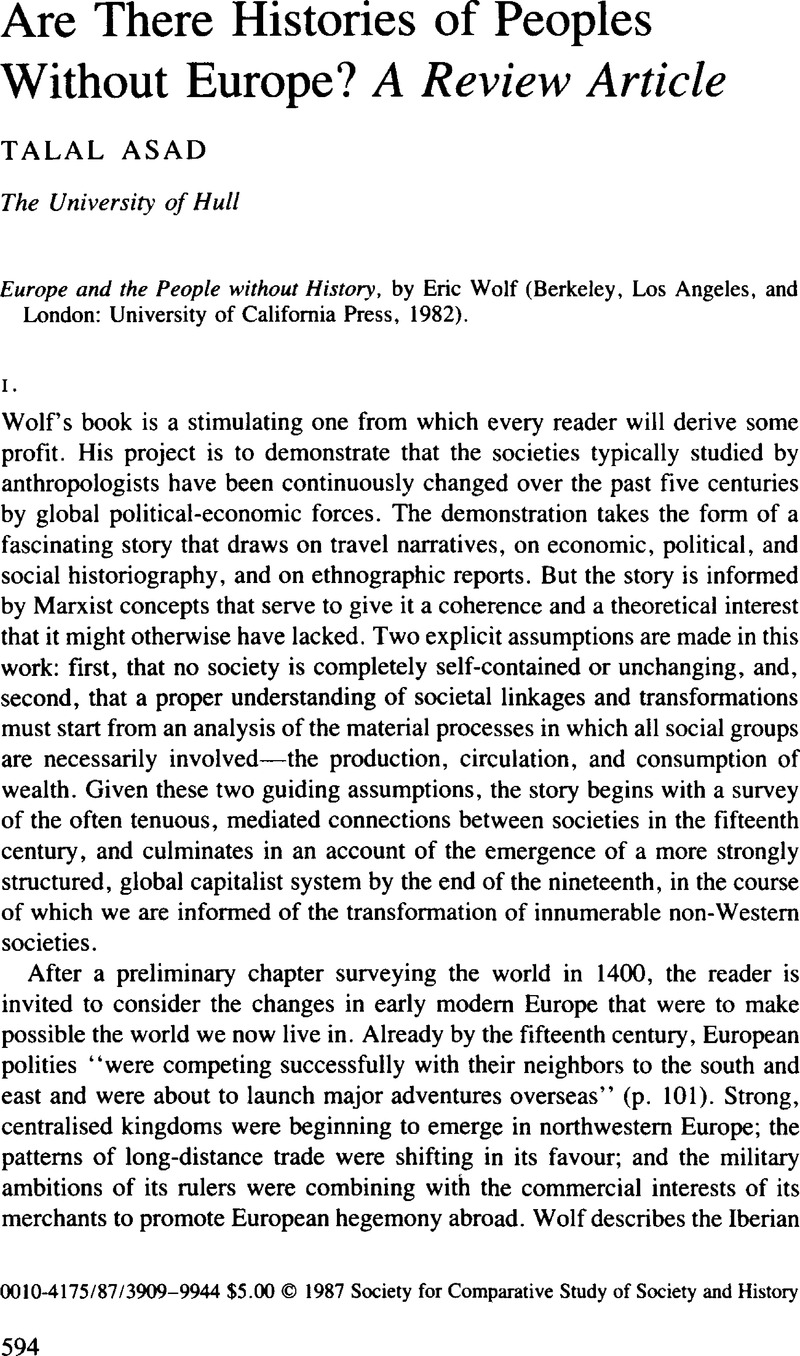Published online by Cambridge University Press: 03 June 2009

1 Panikkar, K. M., Asia and Western Dominance (London: Allen and Unwin, 1959)Google Scholar.
2 Marx, K., Capital (Moscow: Progress Publishers, 1971), III, 333–34Google Scholar.
3 SeeCopans, J. and Seddon, D., “Marxism and Anthropology: A Preliminary Survey,” in Relations of Production, Seddon, D., ed. (London: Frank Cass, 1978)Google Scholar.
4 Wickham, C., “The Uniqueness of the East,” The Journal of Peasant Studies, 12:2, 3 (1985), 186–87CrossRefGoogle Scholar.
5 Ibid., 184.
6 For example, the Ottoman land code, which was promulgated in 1858 partly in response to pressures from the European powers, created new strategic possibilities by its requirement that title to holdings be registered. For contingent local reasons the occupying owner was often unable or unwilling to register. The resulting conflict between custom and law, especially in the Mandatory period after the dismemberment of the Ottoman empire, gave various groups the opportunity to manipulate claims to their advantage. For general discussions, see Warriner, D., “Land Tenure Problems in the Fertile Crescent in the Nineteenth and Twentieth Centuries,” in The Economic History of the Middle East: 1800–1914, Issawi, C., ed. (Chicago: University of Chicago Press, 1966)Google Scholar; and Kerpat, K. H., “The Land Regime, Social Structure, and Modernization in the Ottoman Empire,” in The Beginnings of Modernization in The Middle East, Polk, W. R. and Chambers, R. L., eds. (Chicago: University of Chicago Press, 1968)Google Scholar.
7 There is now a considerable historical literature on these three ethnic groups, but the relevant volumes of the Ethnographic Survey of Africa, published by the International African Institute in the 1950s, are perhaps still the most useful source for an outline of the very different politicaleconomic arrangements found among the three at the time of the British conquest.
8 Asad, T., The Kababish Arabs (London: C. Hurst, 1970)Google Scholar; Cunnison, I., The Baggara Arabs (Oxford: Oxford University Press, 1966)Google Scholar.
9 I have dealt with this subject in “Aspects of Change in the Legal Structure of the Muslim Family in the Punjab under British Rule” (B. Litt. thesis, Oxford University, 1961)Google Scholar.
10 Asad, T., “Primitive States and the Reproduction of Production Relations: Some Problems in Marxist Anthropology,” in On Social Evolution (Proceedings of the Symposium Held on the Occasion of the 50th Anniversary of Wiener Institut für Völkerkunde, Vienna, 12–16 12 1979), Dostal, W., ed. (reprinted in Critique of Anthropology, 5:2 (1985))Google Scholar.
11 Kahn, J. S., “Marxist Anthropology and Segmentary Societies: A Review of the Literature,” in The Anthropology of Pre-Capitalist Societies, Kahn, J. S. and Llobera, J. R., eds. (London: Macmillan, 1981), 84CrossRefGoogle Scholar.
12 In case some readers mistakenly think this conclusion is similar to that of Sahlins, M., Culture and Practical Reason (Chicago: University of Chicago Press, 1976)Google Scholar, it should be made clear that (1) whereas I maintain that there is no key to the secret of any noncapitalist society, Sahlins argues that there is, and that the key is always inscribed in “the cultural logic” of each society, and (2) whereas Sahlins says that the cultural meanings in each society are generated by “symbolic structures,” I argue that they are the product of practices, and that the practices of Western capitalist societies render the cultural meanings of non-Western societies vulnerable but that the practices of the latter do not undermine the cultural meanings of the former.
13 Bloch, 's writings on ideology from a Marxist perspective include “The Past and the Present in the Present,” Man, 12:2 (1977)CrossRefGoogle Scholar; Introduction to Political Language and Oratory in Traditional Societies (London: Academic Press, 1975)Google Scholar; and “Symbols, Song, Dance and Features of Articulation: Is Religion an Extreme Form of Traditional Authority?” Archiv. Europ. Sociol., 15 (1974)Google Scholar. Godelier, 's present thinking on the subject is to be found in “Pouvoir et langage,” Communications, 28 (1978)CrossRefGoogle Scholar, the main ideas of which are reproduced briefly in Verrips, J.'s account of a debate with Wolf held recently in Amsterdam: “The Worst of the Architects is Better than the Best of the Bees,” Critique of Anthropology, 5:2 (1985)CrossRefGoogle Scholar.
14 Jones, a Marxist historian of nineteenth-century England, stresses the multidimensionality of concepts signifying and engaging classes: “because there are different languages of class, one should not proceed upon the assumption that ‘class’ as an elementary counter of official social description, ‘class’ as an effect of theoretical discourse about distribution or production relations, ‘class’ as the summary of a cluster of culturally signifying practices, or ‘class’ as a species of political or ideological self-definition, all share a single reference point in an anterior social reality” (Jones, G. S., Languages of Class: Studies in English Working-Class History, 1832–1982 (Cambridge: Cambridge University Press, 1983), 7–8Google Scholar, Jones's emphasis). Historical languages of class, although never static, have their distinctive morphologies and functionalities. The languages of class employed in nineteenth-century Britain are not replicated in twentiethcentury Egypt. The assumption is made by many students of the Arab world (those writing in English or French as well as those writing in Arabic) that in both places we may identify an urban bourgeoisie, a nascent working class, a Lumpenproletariat, each displaying a recognisable class ideology—but such an assumption is profoundly mistaken. Historical languages constitute classes, they do not merely justify groups already in place according to universal economic structures.